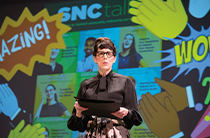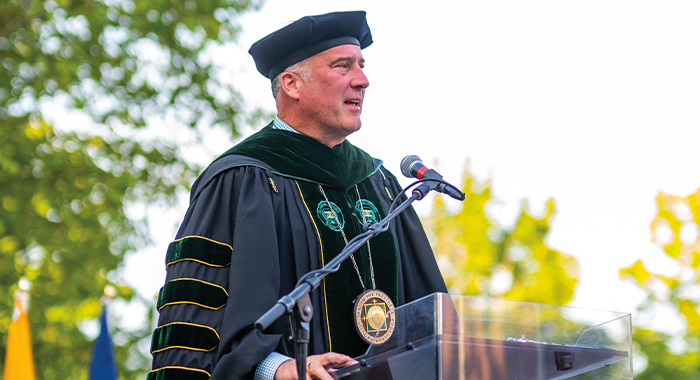Going, But Not Leaving
Twenty-two years of preparation, including 12 years of true discernment, instilled Brian Bruess with the confidence and deep understanding of student development to lead his beloved alma mater. After five years at the helm of St. Norbert College, he departs this summer, leaving the school with firm financial security, a lively sense of its unique Norbertine, Catholic and liberal arts mission, and empowered faculty, staff and student bodies. No small accomplishments that undergird the institution as it continues its dedication to human flourishing.
President Brian Bruess ’90 isn’t busy just tying off loose ends; he’s powering through to the finish line with the same vigor and enthusiasm he and his wife, Carol (Sessler) Bruess ’90, felt when they arrived back on campus in 2017. “It’s a very palpable, memorable feeling. I had never in my wildest dreams imagined that I’d have a chance to be president of my alma mater, the place where Carol and I met, the place that shaped us and formed us,” Bruess says. “Thinking back to that time there was a mix of anticipation and excitement for the opportunity, but also a weightiness because this must be successful.
Securing a bright future
The college was in great shape when Bruess took his post. President Thomas Kunkel led tremendous successes in facility improvements, and the donor base was energized to support his work. Bruess, in his turn, was tasked with leading something less concrete: a pivot to funding the college’s endowment, and with it, maintaining the college’s ability to live out its mission and serve students for the next 125 years. The endowment campaign was publicly launched May 19, 2022, and is well on its way to being fulfilled – its success owing to a dedication to speaking on human terms.
Bruess says, “I try to center what we do in really human terms. When we’re talking about human flourishing, let’s talk about real student examples, faculty examples, staff examples, make it real.” That was most important when clearly expressing, in compelling ways, what it means to be a Catholic, Norbertine and liberal arts college: the three pillars of St. Norbert College’s mission.
Mission radiance
It was Bruess’ priority to ensure the tripartite mission was lived in a newly integrated way throughout campus, beginning with an offering of radical hospitality to everyone: “We need faculty and staff in all quarters … welcoming students, making sure that the work we’re doing – being sophisticated in response to challenges students have – is systemic. … We’ve made great strides to make sure the curriculum and co-curriculum have built-in examples and content about our mission, so we are truly living what we say.”
Fortunately, those efforts were supported by a firm foundation. “We have a history of doing this, before I got here, an ethos and charism of the place. Faculty and staff and students want to be part of a community,” he says. “There’s a sense of collective purpose.” Bruess views as crucial the work done over the past five years to further open the campus community and cultivate a culture that prioritizes equity, diversity, belonging, inclusion and justice (EDIBJ). It’s vital work if SNC is to prepare its students to be world-changers.
 And when the college examines everything, from academic courses to dining, through the lens of serving and teaching students, Bruess says everyone succeeds. Students become invested in creating their own educational experience, faculty and staff are invigorated with a sense of true worth, and the community at-large feels compelled to help through gifts of time, funds and talent.
And when the college examines everything, from academic courses to dining, through the lens of serving and teaching students, Bruess says everyone succeeds. Students become invested in creating their own educational experience, faculty and staff are invigorated with a sense of true worth, and the community at-large feels compelled to help through gifts of time, funds and talent.
The world is fraught with polarization, angst and tension, says Bruess. A lack of critical thinking is evident everywhere. SNC, then, is an institution designed to meet what society needs, now more than ever. “Our community is fully given to [that purpose],” he says. “My favorite thing about this place is when student ideas are manifested. SNCtalks … response to COVID, the raising of the Menominee flag, that was a student initiative, the VAWA grant. … We’re an institution that’s making good on its promises. That’s inspiring.”
His colleagues and fellow college leaders certainly see his successes in amplifying the mission.
The Rev. Jim Neilson ’88, special assistant to the president for mission, says, “He [Bruess] articulated the essential mission of the school in the way he was literally present with us, through thick and thin and good times and bad times, affirming and encouraging one and all to know we are all of us, first and foremost, loved and respected, full of wonder and grace.”
Julie Massey ’87, chief of staff, says, “His vision helped to shape a key leadership position connected to diversity and the curriculum. He’s been a consistent voice for understanding that it is the values of our mission that call us to welcome a richly diverse community on campus. He understands that it is because of our Catholic, Norbertine, and liberal arts tradition that we are called to work to foster equity and belonging and build greater justice.”
The right place, the right time
Bruess says: “One of the things I thought I knew and believed coming in was that a college president should do everything they can to find themself at a place where they fit – where they align with what the institution needs at that time.”
Bruess’ educational background centers on the moral reasoning and identity formation of college-aged students and has served him well as he guided the college through the difficulties of the pandemic. “My leadership tends to be characterized by relationships, empathy, listening, more consultation than directives. That approach was a good approach for the college at this time.”
It was good, he says, only because St. Norbert students are capable of completing enormous tasks. An example of that came early in the 2020 fall semester. The college experienced a wave of COVID-19 infections and was close to having to send its students home. Bruess sent what he calls “the Dad memo,” asking students to adhere to a midnight curfew and a policy of no guests in their rooms. Ten days later, the rate of infection dropped off. “We know that, in theory and in research, that youth respond to high expectations, but I had no idea of the extent 2,000 students could rise to the occasion,” he says
Symbol of communioThe president’s office, overlooking Baer Mall, has had a defining feature over the past four-and-a-half years: a singular lit lamp. What started as an off-hand remark about the president always being in his office from a prospective student’s parent who noticed the lamp continuously lit, has become a defining token from the Bruess presidency.
Neilson says, “That light became a luminous symbol to me of [Brian’s] active and dynamic and thoughtful presence to one and all at SNC.”
Bruess says, “I leave that light on knowing that some students think that I’m here. But it’s a symbol to think of this building as people who think about you, who care about you. And you can come ask for help if you need it.” And it has ties to Norbertine beliefs.
“The Norbertine piece that’s relevant today [for education] is the idea of pursuing peace, reconciliations. The polarization that exists, the conflict that exists in society … . [Radical hospitality] is more than a hello, welcome or opening the door; it’s believing that when you genuinely and authentically welcome someone, they feel valued. And when someone feels valued, their chances of flourishing go up dramatically," Bruess said.
A new, but familiar challenge
Bruess will become the first president for the College of Saint Benedict and Saint John’s University in Minnesota, in the fall of 2022, and Carol will take on an ambassador role. The two storied institutions have been intertwined since the 1960s and Bruess’ appointment sees them fully unified.
He says, “Even though we weren’t looking for this, sometimes a vocational call comes in the most unexpected time. … I know these institutions really well because we’ve competed against them all these years. … It’s a really unique challenge. And [Minnesota’s] where we raised our kids. So, it’s another homecoming for us.” Bruess served at St. Catherine University in Minnesota for 22 years, and Carol is a professor emerita of the University of St. Thomas in St. Paul, Minn.
Bruess says, "I decided in 1993-94 that I wanted to be in Catholic higher education. And I think, because of the intersectionality of its mission. The Catholic intellectual tradition, the Catholic social teaching, these are lofty goals of pursuing justice, of pursuing integration of faith and reason, common good and the dignity of people.
“It’s really holy work.”
Bruess is proud of the work he and Carol have done but is quick to give all the credit to his colleagues and the students at St. Norbert: “Institutions aren’t built around a person, they’re built around a community of people. Leaders come and go. … Norbertines delegate 99.9 percent of responsibilities to the board, and the board delegated 99.9 percent of that to me, and I delegate 99.9 percent of that to the people. People often feel like they don’t have power, but here they do.”
Parting wisdoms
Bruess’ connection to St. Norbert will remain strong. He says, “Carol and I have been telling people we’re going, but we’re not leaving. … I want to support the [new] president and their cabinet. I love this place and I want to continue to see it flourish.”
He says that he expects to see changes and, indeed, hopes to. His only requests are that the new president becomes immersed in the college and honors staff, faculty and student contributions.
He leaves confident in his alma mater: “It’s a great time for a presidential transition. The strategic plan is done, fully funded. The enrollment is looking strong. The campaign is about to be launched. … I am, for better or worse, an optimist by design. But in this case, I see how a college is responding to its headwinds, and I see the output. Not only do I think it will be done, I’m watching it. Success begets success.”
Bruess says, “We’re going to miss our alma mater. It’s been something special … being here, trying to make a difference in a place that is so loved and made such an impact.”
June 30, 2022












